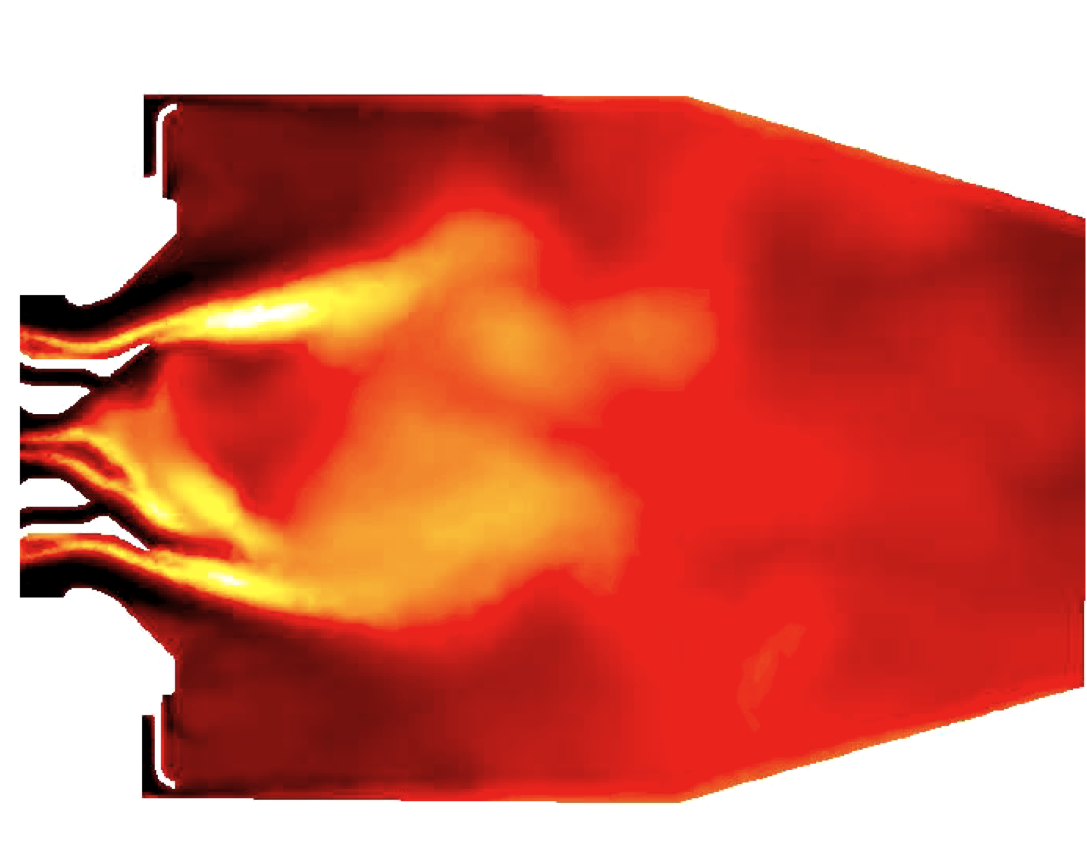Project Description
Towards Lean Combustion (TLC)
Towards Lean Combustion, or TLC, is an R&D project funded by the European Union as FP6 project 12326, and aimed at advancing the state-of-the-art of the technology in lean combustion in aeronautical turbines. Our role in TLC is the application of transported-PDF methods for the modeling of combustion and pollutant formation in aeroengines.
The mitigation of aviation emissions in terms of their environmental impact is a priority for both air quality (local impact) and the greenhouse effect (global impact).
For a fixed engine cycle, the margin of progress depends on the combustor technology. Lean combustion is the breakthrough, which should enable high-level reductions in NOx emissions both during the LTO cycle (air quality) and at cruise speeds (global impact). In addition, lean combustion also enhances particulate reduction. Injection systems form the most critical issue in achieving a satisfactory level of lean combustion and will be the technological focus for the project.
Within this framework, a wide range of experiments are carried out on mono-sector or tubular combustors. This new program represents a crucial effort in achieving sufficient maturity for the single annular combustor application. The objectives are an 80% reduction in NOx emissions in relation to the CAEP2 regulation limit during the LTO cycle, and low NOx emission indices at cruise speed (EINOx=5g/kg as target). Other gaseous emissions and soot performance characteristics will be also precisely evaluated.
In this prospect, the project supports the adaptation of most advanced, non-intrusive laser-based measurement techniques to combustors actual conditions and their application (in addition to intrusive techniques) to experiments of various concepts of injection systems. The injection systems tested will derive from the LOPOCOTEP program or other projects and from advanced CFD optimisation of new concepts. The entire range of operating conditions will be experimentally evaluated (LTO points, cruise speeds). Auto-ignition and flashback risk issue as well as lean extinction limit will be assessed. Advanced CFD simulation will also exploit the data from the fundamental experiments, thereby enabling calibration of the latest codes in emissions predictions.
TLC was carried out by a consortium of 19 European partners, and for a duration of 48 months from 2005-03-01 to 2010-03-31.
The TLC partners were
- ROLLS-ROYCE DEUTSCHLAND LTD & CO KG Germany
- MTU AERO ENGINES GMBH Germany
- AVIO S.P.A. Italy
- TURBOMECA France
- OFFICE NATIONAL D’ETUDES ET DE RECHERCHES AÉROSPATIALES France
- DEUTSCHES ZENTRUM FÜR LUFT- UND RAUMFAHRT E.V. Germany
- LUNDS UNIVERSITET Sweden
- CENTRE NATIONAL DE LA RECHERCHE SCIENTIFIQUE France
- ECOLE CENTRALE DE NANTES France
- KARLSRUHER INSTITUT FUER TECHNOLOGIE Germany
- UNIVERSIT DEGLI STUDI DI GENOVA – DIPARTIMENTO DI MACCHINE, SISTEMI ENERGETICI E TRASPORTI Italy
- UNIVERSITÀ DEGLI STUDI DI NAPOLI FEDERICO II – DIPARTIMENTO DI INGEGNERIA CHIMICA Italy
- CENTRE EUROPÉEN POUR LA RECHERCHE ET LA FORMATION AVANCÉE EN CALCULS SCIENTIFIQUES France
- FUNDACION EMPRESA UNIVERSIDAD DE ZARAGOZA Spain
- UNIVERSITY OF ROME “LA SAPIENZA”, DEPARTMENT OF MECHANICS AND AERONAUTICS Italy
- INSTYTUT MASZYN PRZEPLYWOWYCH IM. ROBERTA SZEWALSKIEGO POLSKIEJ AKADEMII NAUK Poland
- ACIES France
- PROJETS ET RESEAUX DE RECHERCHE France

